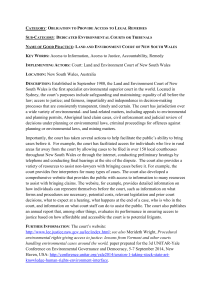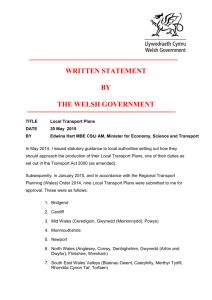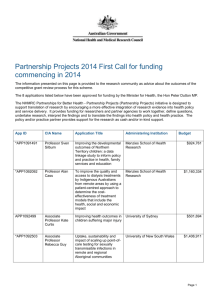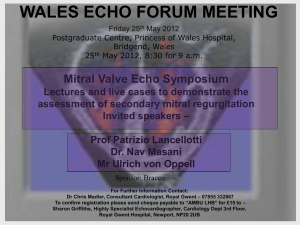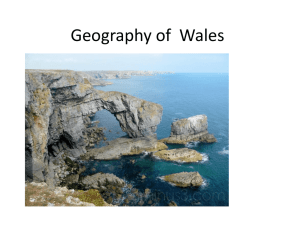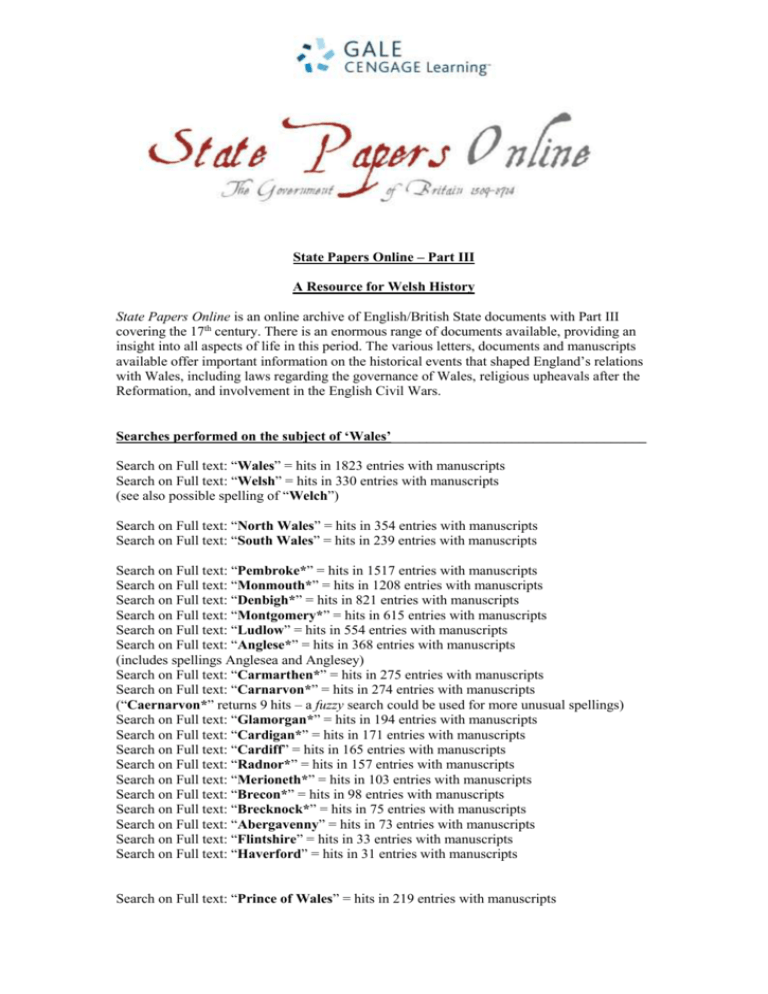
State Papers Online – Part III
A Resource for Welsh History
State Papers Online is an online archive of English/British State documents with Part III
covering the 17th century. There is an enormous range of documents available, providing an
insight into all aspects of life in this period. The various letters, documents and manuscripts
available offer important information on the historical events that shaped England’s relations
with Wales, including laws regarding the governance of Wales, religious upheavals after the
Reformation, and involvement in the English Civil Wars.
Searches performed on the subject of ‘Wales’____________________________________
Search on Full text: “Wales” = hits in 1823 entries with manuscripts
Search on Full text: “Welsh” = hits in 330 entries with manuscripts
(see also possible spelling of “Welch”)
Search on Full text: “North Wales” = hits in 354 entries with manuscripts
Search on Full text: “South Wales” = hits in 239 entries with manuscripts
Search on Full text: “Pembroke*” = hits in 1517 entries with manuscripts
Search on Full text: “Monmouth*” = hits in 1208 entries with manuscripts
Search on Full text: “Denbigh*” = hits in 821 entries with manuscripts
Search on Full text: “Montgomery*” = hits in 615 entries with manuscripts
Search on Full text: “Ludlow” = hits in 554 entries with manuscripts
Search on Full text: “Anglese*” = hits in 368 entries with manuscripts
(includes spellings Anglesea and Anglesey)
Search on Full text: “Carmarthen*” = hits in 275 entries with manuscripts
Search on Full text: “Carnarvon*” = hits in 274 entries with manuscripts
(“Caernarvon*” returns 9 hits – a fuzzy search could be used for more unusual spellings)
Search on Full text: “Glamorgan*” = hits in 194 entries with manuscripts
Search on Full text: “Cardigan*” = hits in 171 entries with manuscripts
Search on Full text: “Cardiff” = hits in 165 entries with manuscripts
Search on Full text: “Radnor*” = hits in 157 entries with manuscripts
Search on Full text: “Merioneth*” = hits in 103 entries with manuscripts
Search on Full text: “Brecon*” = hits in 98 entries with manuscripts
Search on Full text: “Brecknock*” = hits in 75 entries with manuscripts
Search on Full text: “Abergavenny” = hits in 73 entries with manuscripts
Search on Full text: “Flintshire” = hits in 33 entries with manuscripts
Search on Full text: “Haverford” = hits in 31 entries with manuscripts
Search on Full text: “Prince of Wales” = hits in 219 entries with manuscripts
Search on Full text: “Princess of Wales” = hits in 2 entries with manuscripts
Search on Full text: “Earl of Pembroke” = hits in 522 entries with manuscripts
Search on Full text: “Earl of Montgomery” = hits in 224 entries with manuscripts
Search on Full text: “Council of Wales” = hits in 163 entries with manuscripts
Search on Full text: “Lord President of Wales” = hits in 81 entries with manuscripts
Search on Full text: “Council of Marches” = hits in 69 entries with manuscripts
Search on Full text: “Marches of Wales” = hits in 111 entries with manuscripts
*denotes searches performed where * has followed the search
term to ensure instances of both the search term and longer forms
of that word, such as ‘Monmouth’ and then ‘Monmouthshire’ have been included in the results
Full text searches on Wales and other aspects of 17th-Century Welsh history include the
following titles with manuscripts:
Wales_____________________________________________________________________
“Strange new and true news out of Wales…” (1673)
SP 30/F
“Strange, new, and true news out of Wales, of the late
discovery of a wild man, or mighty gyant, strange of
shape, supposed to be about 11 foot in height; with the
true description of his person habit and deportment; with
the manner how he was discovered and in what place;
with the manner of his carriage towards those that did
discover him, and also the conjectures of the country
people what he is.” To which is appended an account of
sundry other giants. Printed.
Strange, new, and true news out of
Wales. SP 30/F
Strange, new, and true news out of Wales. SP 30/F
“Order and manner of holding the Court at the Great Sessions for Wales.” (1603)
SP 14/5 f.163
“Remonstrance against the Statute 34 Hen.VIII. c. 26 [repealed 21 Jac. I. c. 10], whereby
the King is empowered to make laws for Wales by Letters Patent.” (10 Feb.? 1606)
SP 14/18 f.112
“Act for better explaining the Act, 34 Hen. VIII., concerning Wales, and for declaring
the Counties of Gloucester, Worcester, Hereford, and Salop free from the jurisdiction of
the Council of Wales.” (10 Mar. 1606)
SP 14/19 f.50
“Examination of the above Act; with a list of the Presidents of Wales, from 18 Edw. IV.,
and notes of their places of residence.” (10 Mar. 1606)
SP 14/19 f.53
Examination of the above Act. SP 14/19 f.53
“Petition of the Welsh members of Parliament to the King.” (Feb. 1621)
SP 14/119 f.272
Petition of the Welsh members of Parliament to the King, for permission to bring in
a bill for repeal of a clause in the Act 34 Hen. VIII., empowering the King to enact or
alter laws for Wales at his pleasure, without authority of Parliament; such a proviso,
inserted whilst the Government was untried, being no longer necessary.
“State of the suit concerning the misappropriation of coal…” (1603)
SP 14/5 f.180a
State of the suit concerning the misappropriation of coal and conduct money paid in
the late Queen's time, which the Deputy Lieutenants of certain counties in Wales
profess to have expended in different ways for the benefit of the county.
“List of the Deputy Lieutenants for the several counties of South Wales, signed by the
Earl of Carbery.” (1663)
SP 29/88 f.146
“Memoirs by J. D…” (27 April? 1604)
SP 14/7 f.252
Memoirs by J. D. of the principal unions of kingdoms that have taken place in
Europe, viz., Wales with England, Navarre and Aragon with Castile, Spain and
Portugal, Normandy and Bretagne with France, the Netherlands with the House of
Austria; and the conditions of each.
“An Act extending a former Act concerning replevins and
avowries to the principality of Wales and county palatines.”
Printed. ([8 Feb.] 1667)
SP 29/191 f.96
“Thomas Bushell, his Majesty's servant, to the King.” ([9 July?] 1637)
SP 16/363 f.165
Understanding that your Majesty has granted a mint for Ireland, as well as your
predecessors have allowed of mints at Durham, Bristol, and Kidwelly Castle, Bushell
states seven reasons why a mint in Wales may prove of great consequence to the
King, both by way of honour and profit. The mines worked by Sir Hugh Middleton
were drowned by water, but Bushell had discovered how to drain them by way of
adit…A mint in Wales would afford the requisite encouragement. Bushell
anticipated the separation of 300l. of silver weekly out of ore, wherefore he prayed
the allowance of a mint at the castle of Aberystwith.
Pembroke: (see also Earl of Montgomery below)___________________________________
“The poore men's petition to their King,” ([17 Apr.] 1603)
SP 14/1 f.64
“The poore men's petition to their King,” for uniformity in religion, provision for
soldiers, &c.; and against delays in law, plurarality of offices, monopolies, export of
ordnance, and impositions; also against the creation of Sir Walter Raleigh as Earl of
Pembroke.
“The Committee of both Houses to Col. [John] Lambert.” (20 July 1648)
SP 21/24 f.247
After a long siege Pembroke town and castle having been won for the Parliament,
Lieut.-Gen. Cromwell and his forces are set at liberty for other service, so we have
sent him order to march with what forces may be spared with the safety of South
Wales into the North to suppress the enemy there.
“The Earl of Pembroke to the Prince of Orange.” (2 Mar. [1671])
SP 8/1/1 f.94
Though there is no further thoughts of my serving your Highness in time of peace, I
hope you will give me leave to wait on you whenever there may be thoughts of
action.
“Anne Countess of Pembroke to Williamson.” (16 Jan. 1668)
SP 29/232 f.191
I would have served you in your wish to be chosen burgess of Appleby, in place of
John Lowther, deceased, but for a prior engagement to my own grandchildren in the
southern parts, and some of my own kindred and friends in those parts.
Anne Countess of Pembroke to Williamson. SP 29/232 f.191
“The King to the Earl of Pembroke, Lord Warden of the Stannaries.” (20 Feb. 1603)
SP 14/12 f.200
Confirms the privileges granted to the Stannaries, of freedom from certain taxation,
and from any jurisdiction save that of their own court, and requires that certain
attempts lately made to render them amenable to common law be put down.
“Reasons on behalf of the town of Tenby, Pembrokeshire…” ([14 July] 1676)
SP 29/442 f.69
Reasons on behalf of the town of Tenby, Pembrokeshire, for the suppressing of a
market erected in the late times of rebellion in the village of Narberth and for
granting no patent for a market there.
1. Tenby is an ancient corporation with many privileges by several charters
and has two weekly markets.
2. The town has a very convenient and secure port with a pier and is the only
secure haven in that great and dangerous bay between Milford, Carmarthen and
Barry….
“The case of the Earl of Pembroke, Mr. Ludlow, and Mr. Hawles…” (Sept.? 1660)
SP 29/16 f.203
The case of the Earl of Pembroke, Mr. Ludlow, and Mr. Hawles, in reference to
their interest in Clarendon Park, showing that William, late Earl of Pembroke,
Ranger of the Park, consented to the destruction of the conies, on condition of having
the forestership to himself and his heirs…
Seal of the Earl of
Pembroke.
(Taken from
SP 16/412 f.51)
Monmouth:_________________________________________________________________
“An Act concerning the sequestration of South Wales and county of Monmouth…”
(23 Feb. 1649) SP 18/1 f.18
An Act concerning the sequestration of South Wales and county of Monmouth,
imposing fines on the respective counties for their delinquencies, viz.:—
Pembroke: 3,500; Cardigan: 3,000; Carmarthen: 4,000; Glamorgan: 3,500; Brecon:
2,000; Monmouth: 3,000; Radnor: 1,500; Total: 20,500
“Col. Edward Massie to the Committee of both kingdoms.” (6 Oct. 1644)
SP 21/17 f.33
Yours of the 28th ult. reached me at Monmouth…By this time the Welsh themselves
do as much dislike their company as they did ours. We hope by continuing them there
they will daily fall away, or at best fall to loggerheads amongst themselves. You have
already been informed of our entrance into Monmouth, and I shall therefore only
briefly narrate the manner of our proceedings. Some offers were made by Lieut. -Col.
Kyrle to deliver the town into my hands, but these proved unsatisfactory, so it
remained until the time we set upon it suitable to my desires…
“Warrant for a grant to Sir James Scott, the King's natural
son, of the title of Duke of Monmouth, Earl of Doncaster, and
Baron of Fotheringay.” (10 Nov. 1662)
SP 29/62 f.159
James Scott, duke of Monmouth and
Buccleuch (1649-1685). © National
Portrait Gallery, London.
“Four Justices of Monmouthshire to Sir Leoline Jenkins.” (23 Dec. 1681)
SP 29/417 f.362
The growth of Fanaticism in this county is of so dangerous a consequence that we
conceive ourselves obliged to represent the great concourse that duly frequents
conventicles, especially in Abergavenny, where on the Sabbath day at the time
others go to divine service they as publicly resort to their meetings, whom we look on
as more dangerous in regard some of them have been actually in arms against his late
Majesty…
Four Justices of Monmouthshire to Sir Leoline Jenkins. SP 29/417 f.362
Denbigh:___________________________________________________________________
“Act of Parliament…” (Feb. 1649)
SP 25/87 f.9
Act of Parliament constituting Basil Earl of Denbigh, Edmund Earl of Mulgrave,
Philip Earl of Pembroke… or any nine of them, a Council of State for the
Commonwealth of England :—
1. To oppose the pretensions of Charles Stuart, eldest son of the late King.
2. To direct the militia to preserve safety and suppress tumults, and give commissions
to raise and arm forces on any emergency…
“Basil Earl of Denbigh to the Grand Committee of Accompts of the kingdom.”
(26 July 1645) SP 16/510 f.32
I have sent the bearer, my servant, to attend the auditing of my accounts, which you
will please to examine and certify the true state thereof, for that the speedy finishing
of them concerns me nearly.
Basil Earl of Denbigh. SP 16/510 f.32
“Valuation of the materials of Lions, alias Holt Castle, co. Denbigh.” (24 Oct. 1608)
SP 14/37 f.68
“High Sheriff and Justices of Denbighshire to the Council.” (25 Apr. 1622)
SP 14/129 f.99
The manufacturers of the county say that their trade is confined to cottons and
friezes. They know of no reason for delay in the sale thereof, except that the
Shropshire drapers no longer frequent Oswestry market as before, and think the
restoration of the market to Oswestry would revive the trade
“[The Sec. Conway] to Att. Gen. Coventry.” (21 Nov. 1624)
SP 14/175 f.25
The Earl of Denbigh, Master of the Wardrobe, claims allowance for many
extraordinary provisions, which he conceives not to be within the ordinary charge of
the office. The King wishes him to prepare a Commission to the President of the
Council, the Earl Marshal, and others, to report what are ordinary and what
extraordinary expenses, taking notice of the reduction of the wardrobe expenses to
10,000l. a year, beside the assignments by Act of Parliament.
“Sec. Conway to Solicitor General Sheldon.” (23 Apr. 1626)
SP 14/214 f.127
To prepare a Commission for the town of Denbigh to take musters, impress soldiers,
&c., as they formerly did.
Montgomery:_______________________________________________________________
“Sir John Meldrum to the Committee of both kingdoms.” (2 Oct. 1644)
SP 21/17 f.17
Upon sight of your last letters directed to Sir Wm. Brereton and the Committee at
Manchester requiring their best assistance in raising the siege of Montgomery
Castle, being a place of great concernment for the reduction of North Wales, I
desired Sir Wm. Brereton to leave two troops of horse, which with Sir Thos.
Middleton's foot could within three days have furnished the castle with victuals…
“Justices and Gentlemen of Merionethshire and
Montgomeryshire to the Council.” ([6 June] 1622)
SP 14/131 f.24
Remonstrate against the removal of the Welsh
cloth-market from Oswestry to Shrewsbury. Intreat that
it may be re-established at Oswestry, and that the Welsh
clothiers may exchange their cloths with merchants
bringing grain, &c. to the seaports of North Wales.
Justices and Gentlemen of Merionethshire and
Montgomeryshire to the Council. SP 14/131 f.24
“Grant to Philip, Earl of Montgomery, of the site of Montgomery Castle.” (9 Feb. 1606)
SP 14/60 f.22
“Challenge of four Knights Errant of the Fortunate Islands…” ((1 June 1609)
SP 14/22 f.1
Challenge of four Knights Errant of the Fortunate Islands, [Earls of Lenox, Arundel,
Pembroke, and Montgomery.] to maintain four propositions relating to love and
ladies, addressed to all honourable “Men at Arms, Knights Adventurers of Hereditary
Note, that for most main tenable actions wield the sword or lance, in the quest of
glory.”
“Philip Earl of Pembroke and Montgomery, Lord Chamberlain, to the Lords of the
Admiralty.” (23 Apr. 1631)
SP 16/189 f.40
Since the King has committed to him the
Vice-Admiralty for South Wales, he is
bound to let them know that the King's
service suffers much in those parts for want
of a Judge and Registrar.
Philip Earl of Pembroke and Montgomery.
SP 16/189 f.40
“Petition of the burgesses and inhabitants of Llanvilling, co. Montgomery, to the
King…” (14 June 1669)
SP 29/26 f.103
Petition of the burgesses and inhabitants of Llanvilling, co. Montgomery, to the
King, for a charter of incorporation by their ancient names, and for leave to enjoy
their former rights and privileges, with such other additions as will tend to the
preservation of the peace and well government of the town.
“Warrant for a grant to the burgesses, &c., of Llanvilling, co. Montgomery, of
incorporation.” ([21 Nov.] 1669)
SP 29/267 f.336
Annexing: Heads of the charter desired by the said burgesses, confirming their
former charters, with a few alterations and, additions; giving the names of the
present bailiffs and 15 burgesses, &c.
Warrant of a grant to the burgesses of Llanvilling, co. Montgomery of incorporation.
Names of present bailiffs and burgesses. SP 29/267 f.336
“The Dukes of Albemarle and Monmouth and 22 other peers to the King.” (May? 1681)
SP 29/415 f.367
Petition for a pardon to the
Earl of Pembroke and
Montgomery, who stands
indicted by the grand jury of
Middlesex for the death of
William Smeeth…If he be
found guilty of manslaughter,
he must undergo the same
judgment as if he had
committed the most designed
and barbarous murder, having
once already had the benefit
of clergy, and, though his
Majesty, on hearing of his
trial should find never so
much cause for mercy, he
cannot be restored to his title and
honours but by Act of Parliament.
Petition of the Dukes of Albemarle and Monmouth and
22 other peers to the king. SP 29/415 f.367
Further references to Welsh counties__________________________________________
“Earl of Anglesey to Sam. Pepys.” (22 Nov. 1667)
SP 29/223 f.61
A new sale of ships must be appointed with speed, that affair having been enquired
after at the Council. Capt. Nicholls is to have his bill of sale of the ship sold him, and
such small things as are wanting and his contract will bear. If there is any need of my
coming on Tuesday, I will not fail.
Earl of Anglesey to Sam. Pepys. SP 29/223 f.61
“Notes in Lord Digby's hand…” (8 Sept. 1645)
SP 16/510 f.173
Notes in Lord Digby's hand, entitled “Certain heads to be remembered by Mr. Rudd
to be moved to the Lord Asteley,” signifying the desires of the gentlemen of
Carmarthenshire. That Pembrokeshire is wholly regained by the enemy…That
the enemy at this time being masters of the field these cos. of Carmarthen and
Cardigan are exposed to be absolutely plundered…the enemy of
Montgomeryshire lying upon the borders of Cardigan.
“The Committee of both Houses to the Committee of North Wales.” (21 Sept. 1648)
SP 21/25 f.47
By the letters we have seen we believe there is no great probability of reducing the
Isle of Anglesey by treaty, and therefore desire you to use your best endeavours to
effect it by force.
“Representation from the people of South Wales touching Chepstow Bridge.” (1661)
SP 29/66 f/75
“A list of popish recusants charged with armour within the co. of Glamorgan.”
(2 Jan. 1626) SP 16/18 f.8
“Pres. Lawrence to Col. Rowland Dawkins, Deputy Major-General for co. Glamorgan.”
(10 July 1656) SP 25/77 f.921
Hearing that people from several parts frequently assemble unlawfully at Caerfilly,
co. Glamorgan, under colour of holding a market and fair, though without authority,
and that many disorders are committed at these meetings, Council desires you to learn
their nature, and improve your care to suppress them, and to prevent the disorders
occasioned thereby, that public peace may not be disturbed.
“Names of collectors [for the loan] in the Counties of Worcester, Salop, Hereford,
Radnor, Flint, Denbigh, Cardigan, Brecon, Merioneth, Carnarvon, Carmarthen, and
Gloucester.” ([undated 1626?])
SP 16/44 f.16
“Justices of the Peace for co. Radnor to the King.” (22 Mar. 1637-8)
SP 16/386 f.41
By reason of the plague, the better sort of the inhabitants of Presteigne departed
thence, and have not returned. The major part of those that now reside are fallen into
extreme necessity, neither are their markets yet frequented.
“List of recusants in the several parishes of the Archdeaconry of Brecon, with
particulars of the estate, age, &c, of many of them. Presented at the inquisition at
Brecon, March 12 and April 8 and 9.” (10 Apr. 1624)
SP 14/162 f.68
“The Deputy-Lieutenants of co. Brecon to John Earl of Bridgwater, Lord President of
the Marches of Wales.” (15 May 1640)
SP 16/453 f.111
According to the Lords' commands we have pressed 200 able men for service, and
delivered them to the Lord General's officers to be exercised, though not without
much difficulty in regard of the little assistance we had from William Watkyns,
bailiff of the town of Brecon, who, although often desired to press 12 able men out
of that town, being but a small proportion in regard of the population and extent of
the town, consisting of 11 wards, and having two constables to each, yet brought only
eight, affirming that he was the King's lieutenant within that town, and, therefore,
might appoint what number he pleased, and not to be required by us.
“Petition and certificate of the gentry, freeholders, and inhabitants of co. Brecon to the
Protector.” (29 July 1654)
SP 18/73 f.151
According to a writ
directed to John
Williams, high sheriff,
for electing a member
to serve in the
Parliament to meet 3
Sept. next, we
assembled peacably and
unarmed at Brecon on
12 July, being qualified
to vote, but were
menaced and terrified
from giving our votes
according to our
conscience…28
signatures.
Petition and certificate of the gentry, freeholders, and inhabitants of Co. Brecon. SP 18/73 f.151
Prince of Wales_____________________________________________________________
“Patent of creation of Prince Henry as Prince of Wales, and Earl of Chester.” (Latin.)
([4 June] 1610) SP 14/55 f.15
“Ceremonial preceding and attending the creation of Prince
Henry as Prince of Wales.” ([4 June] 1610)
SP 14/55 f.21
Account of the ceremony of investiture of the Prince,
as Prince of Wales.
“Opinions in reference to suitable alliances for the Prince of
Wales and Princess Elizabeth.” (Dec. 1611)
SP 14/67 f.109
Opinions in reference to suitable alliances for the Prince
of Wales and Princess Elizabeth. Danger of encouraging
Popery by introducing a daughter of Savoy or Spain into
England. The Prince of Piedmont an unequal match for the
Princess, unless the King of Spain will give him the duchy
of Milan on his marriage, which is not likely, as that King
Henry, Prince of Wales (1594-1612).
is said to want her for himself She could not marry him
By Marcus Gheeraerts the Younger.
© National Portrait Gallery, London.
without changing her religion, and such a marriage would
All rights reserved.
be dangerous to the two that are between her and the
Crown. A match with Sweden or the Prince Palatine suggested
for her, and for the Prince one with the house of Saxony,
Brandenburg, or Palatine.
“Physician's report on the post-mortem, examination of Henry Prince of Wales.” (Latin.)
(7 Nov. 1612) SP 14/71 f.42
“Elegy on the death of Henry Prince of Wales.” (Nov. 1612)
SP 14/71 f.82
“Proceeding at the funeral of the Right High and Mighty Prince Henry, Prince of
Wales.” (7 Dec. 1612)
SP 14/71 f.106
“Order of the creation of Prince Charles as Prince of Wales, as it was celebrated at
Whitehall, and of the dinner given afterwards.” (4. Nov. 1616)
SP 14/55 f.30
Bond by Charles Prince of Wales:
Seal with royal arms and crown.
SP 16/516 f.225
“Pope Gregory XV. to Charles Prince of Wales.” (10 Apr. 1623)
SP 14/142 f.118
Regrets the altered state of Britain. Hopes that as under his predecessor, Gregory the
Great, apostolic authority was there established, he may be permitted to see it reestablished, by the conversion of the Prince, “the flower of the Christian world,”
who proves, by seeking to marry a Catholic Princess, that he does not hate the see
of Rome. Sets before him the example of his ancestors, and hopes he will become the
“infranshiser of Brittayne.”
“Charles Prince of Wales to Pope Gregory XV.” ([18 June] 1623)
SP 14/147 f.12
Hopes to imitate his glorious ancestors, who ventured their lives for the cross of
Christ. Will do his utmost to banish hatred and dissentions from the Christian world.
Has no designs against the Catholic religion, and hopes that as all acknowledge God,
and Christ crucified, all may profess the same faith. Thanks for his Holiness's letter.
“Charles Prince of Wales to the King.” (1631)
SP 16/205 f.16
Petition in verse soliciting the King to translate a Welsh Bishop connected with the Prince's
nurse.
“Sire, I have learn't of you. When you were young,
Your servants made your princely hand their tongue.
‘Ere you could speak, ‘ere you were past your spoon,
My royal grandsire granted you your boon;
Then grant me mine, from crying I shall rest,
Only bless him who me, born, unborn, blest.
My suit, suits me, I keep within my pales,
For a Welsh Bishop, who am Prince of Wales,
For one whose suit his service long endears,
Your Mother's, Father's, beadsman twenty years.
Little Charles begs a boon of Charles the Great,
And ‘tis to gratify a nurse for teat.
It is my infant suit, if it be sped,
The manner of it may be chronicled,
How Charles the Babe so soon did undertake
The office of a King, a Bishop make.
Your Godlike power of nothing can create,
Lowly is my request, but to translate.
Till I can speak, no more. [Long may you live,
That I may learn to [ash, and you m]ay] give.”
Charles Prince of Wales to the King. SP 16/205 f.16
“The Birth of the Prince of Wales.” (22 Oct. 1688)
SP 31/4 f.160
Report of the meeting of an Extraordinary Council…whereat the King, intending to
go in person against the Prince of Orange, should he invade the Kingdom, spoke
concerning the report that the Prince of Wales was a supposed child, the Queen
Dowager testified to having been present during the whole time of the Queen's
labour and delivery, and the depositions (given in full) of the following persons
were taken on oath…
Council of Wales____________________________________________________________
“Commission appointing Edward Lord Zouch, Lord President of the Council in Wales,
to be the King's Lieutenant in Wales.” (13 April 1603)
SP 14/1 f.44a
“Reasons assigned by the four English counties against their being under the
jurisdiction of the Council of Wales, and included as such in the instructions to be given
to the Council.” (1606?)
SP 14/24 f.127
“View of the differences…” (Dec? 1604)
SP 14/10A f.201
View of the differences between the Court of King’s Bench and the Council of the
Marches in Wales, in the case of a poor widow and ——Farley ; with arguments in
favour of the counties of Gloucester, Hereford, Worcester, and Salop remaining
within the jurisdiction of the Council of Wales.
“Instructions given by the King to his Council within his dominion and principality of
Wales; with appointment of the Council.” ([undated] 1606?)
SP 14/24 f.128
“Lord. Eure, President, and the Council of Wales, to Salisbury.” (26 Jan. 1608)
SP 14/31 f.74
Determined opposition of the Justices of Herefordshire and Worcestershire to the
authority of the Council of Wales.
Lord Eure,, President, and the Council of Wales to Salisbury. SP 14/31 f.74
“Memorandum of the differences between the present and former instructions, relative
to the office and powers of the President and Council of Wales.” (1 Feb. 1608)
SP 14/31 f.105
“Memorial for the Earl of Salisbury…” (Feb.? 1608)
SP 14/31 f.106
“Memorial for the Earl of Salisbury,” on the King's powers in reference to the
Council of Wales, with collections out of original records, &c., relative to the
jurisdiction of the Marches of Wales over the English shires.
“Advantages that would arise…” (Feb.? 1608)
SP 14/31 f.109
Advantages that would arise by having the four English counties exempted from the
jurisdiction of the Council of Wales, and by the abolition of that Council, which is
no longer needed to suppress riots, “Wales being as civil as England.”
“Sir Herbert Croft to Somerset.” ([March] 1614)
Gives an historical view of the question of the jurisdiction of the Council of Wales
over the four English Border counties, proving that they do not lawfully belong to the
Marches of Wales. With similar marginal notes by the King.
“Instructions to the Earl of Carbery, Lord President, and the Council of the Principality
and Marches of Wales, for its government.” (11 Feb. 1661)
SP 29/41 f.56
Examined by Attorney General Palmer, February 11, signed September 9, 1661.
“Further instructions to the Earl of Carbery…” (27 Mar. 1671)
SP 29/288 f.180
Further instructions to the Earl of Carbery, Lord President of the Council of
Wales and the Marches, and the members of the said Council, concerning the
administering of oaths and affidavits, and the fees payable thereon.
“[Sir George Treby, Attorney-General] to the King.” (Dec. 1689)
SP 8/6 f.165
Report on the future government of Wales, the Court of the Lord President and
the Council thereof, being now abolished, “by your Majesties' great grace and
favour and to your subjects' great satisfaction there.” That court being abolished, the
office of President is also abolished there being nothing for him to do…It is necessary
that a Lieutenant be appointed to govern the militia; he may be either a commoner or
a peer, and either of all Wales, or any particular county. I am opinion that to make a
commoner Lieutenant of all Wales, or of any county thereof, will not be for your
service. If you appoint one for North Wales and one for South Wales, I would
propose for North Wales, Lord Newport, now Lord Lieutenant of Shropshire, or the
Earl of Bridgewater, the greatest
part of whose estate lies in
Shropshire, and whose ancestor was
Lord President, or Lord
Willoughby who has a good estate
in two counties in North Wales. For
South Wales, I propose the Earl of
Pembroke, whose ancestors have
had great possessions there, or Lord
Carbery who is a native, and has a
residence there…Moreover the
gentlemen of Wales have always
coveted to be governed immediately
by the King, or by the Prince, and,
by the means suggested. you take
them into your immediate
Map of Wales and the East coast of Ireland, from The
protection.
Mercator atlas of Europe, 1570-1572. By Gerhard Mercator.
© The British Library Board. All Rights Reserved.
Marches of Wales___________________________________________________________
“Queries on behalf of the Council in the Marches of Wales, as to the jurisdiction of the
King's Bench in Welsh causes, and the inadvisability of taking the Judges as
arbitrators.” (Dec.? 1604)
SP 14/10A f.213
“Statement that in all former times the jurisdiction of the Marches of Wales…” (1672)
SP 29/304 f.82
Statement that in all former times the jurisdiction of the Marches of Wales was
considered to include cos. Worcester, Gloucester, Salop, Hereford and Monmouth,
but the Earl of Carbery consented to have their names omitted in his patent, to please
the Earl of Clarendon…
“Opinion of the two chief justices…” (Dec.? 1604)
SP 15/36
Opinion of the two chief justices on 60 points not given in the instructions for the
Council in the Marches of Wales, as to the times and places of holding sittings or
terms, punishing offenders, extent of jurisdiction over the four counties, and of
authority in cases of title, debt.
“Names of persons recommended to be of the Council for the Marches of Wales.”
([undated] 1618?) SP 14/104 f.158
“Two petitions from subjects of the
Marches of Wales…” (17 June
1661)
SP 29/37 f.131
Two petitions from subjects of the
Marches of Wales especially those
of Gloucestershire, to the King, for
the re-establishment of the Court of
the Council in the Marches of
Wales, to save them the trouble of
travelling far to Westminster.
Numerously signed.
Petition from subjects of the Marches of Wales.
SP 29/37 f.131
“Petition of the Inhabitants of the Marches of Wales…” ([10 July] 1661)
SP 29/39 f.85
Petition of the Inhabitants of the Marches of Wales, and especially of the county
and city of Worcester to the King, for restoration of the Court of the Council of the
Marches in Wales, so as not to be compelled in ordinary eases to have their causes
tried at Westminster, which they find threefold more expensive. With five sheets of
signatures,
“Reasons, by Sir R. Lloyd, for re-establishment of the Court and Council of the Marches
in Wales, as being of ancient appointment, and greatly tending to peace and justice in
those parts.” (10 July? 1661)
SP 29/39 f.84
“Account, by the President of the Principality and Marches of Wales, of the expenses of
the diet of the Lord President, and the salaries of the Assistant Council in Ordinary,
amounting to 1,916l. 13s. 4d. a year.” (29 Aug. 1667)
SP 29/215 f.73
Map of England and Wales taken from Christopher
Saxton's Atlas, London, 1579. © The British
Library Board. All Rights Reserved.
Clare Gazzard for Julia de Mowbray
Please contact Julia de Mowbray with any questions (julia.demowbray@cengage.com)




